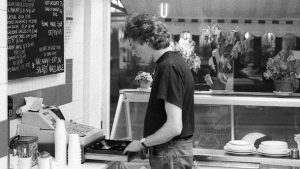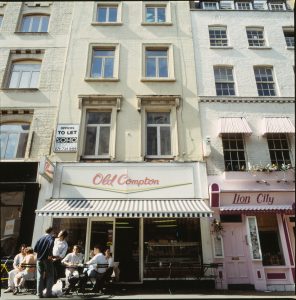In the middle of lunch service on a Friday in May, seated in the corner of a bustling Balans, a well-dressed, pea coat-adorned gentleman was sipping on a flat white. As I approached David Taylor, co-founder of Balans, for this interview, he admitted his nerves in conducting the next 40 mins of our conversation. “I’m not very good at these things” he warned me. And so began our sparkling conversation re-visiting the good, the mad and the best bits of Balans’ 30 year history and what the future holds for Soho’s gem.

Tell us about the early days as the Old Compton Café
“It started as a sandwich shop, quite different from today’s sandwich destinations like Pret A Manger. You used to come in and build your own sandwich by selecting ingredients, and behind the counter, we were slaving away putting all the sandwiches together by hand. They are a lot less common now, but I believe you can still find some in the City.”
Can you remember any notable orders in those early days?
“Rowan Atkinson used to come in for our bestselling chicken and bacon mayo sandwich on granary bread. And Ronnie Scott was also a regular, he came in with his partner Pete King before his club would open and always had toast with marmite and a cup of tea.”
What made you want to start a sandwich shop?
“Just about everything I’ve done was accidental. I didn’t go to university and was quite wild when I was young. When I was 24 I had no idea what I wanted to do, but I was offered a job in McDonalds, flipping burgers in Shepherds Bush. The guy who gave me the job was my soon-to-be business partner, Prady Balan, who was setting up this sandwich bar with his wife Sally and her friend, Charles Cotton. When Charles later decided to move to New York in 1989, Prady asked me if I wanted to buy him out, and he gave me until the weekend to decide. I’d always wanted to have my own business, and the opportunity just came out of the sky, and so Prady and I ended up in a partnership.”
From Sandwich Bar to 24 Hours….
“I had a friend who used to DJ at The Hippodrome and The Limelight, two big clubs in Leicester Square. And he said ‘there’s nowhere to go after work, apart from Bar Italia.’ I suggested we open later. We were already opening the first thing in the morning for the builders and then, because we had a theatre next door, we’d cater for the theatre crowd post-show. We started staying open later and later, and ended up open 24 hours. I had no time to sleep, I was working every shift. My wife said I was green when she met me because I hadn’t seen sunlight. The whole thing was a little insane. “

How has Balans adapted to the many changes that have happened in Soho over the past 30 years?
“Old Compton Street used to have only a handful of eateries – two pubs, us, one other, then Bar Italia around the corner. We fed the people who lived and worked in Soho. Soho was more village-y back then and wasn’t the wall of restaurants it is now.
I watched a documentary about the gangs that were running the vice trade sex shops in the 70s when Soho was going through quite a heavy period. Anyway, to my surprise the boss of the biggest gang, and the alleged murderer, was one of our ‘old boy’ customers. He and his mate would come in and have a cup of tea every morning. That’s an example of how we had Soho Life walking through the door….
When we opened at No. 60 in 1993, most places were open between 12 and 3pm, shut till 6, and then would open again for dinner, as people back then conformed more to a conventional daily routine. But we knew there were people in Soho who didn’t live like other people. We had customers who had been working overnight editing MTV promo videos and things like that, who’d want to have breakfast at 2 in the morning or 3 in the afternoon. So we would be open all hours and were one of the first places to do brunch before it became a thing.
Staying open overnight coincided with the whole dance scene, when people did one-nighters and Heaven nightclub opened. There was a big clubbing market and a big gay scene going on around the clubs. We became a place for people to hang out. Marilyn used to come in most nights and Fat Tony lived upstairs. So you’d begin the day with the builders in the morning, who’d want a quick breakfast, all fresh and ready to start their day, going right through to when you’d have the last remnants of clubbers impaired by ecstasy, clutching their bottles of water. And then at eight o’clock in the morning, the builders were back in again and sometimes the two parties would cross over.
Soho was different then; there were quite a few illegal drinking clubs that provided people with a place to drink when everywhere else had shut down due to licensing laws. Our licensing, however, has been ‘grandfathered in’. We had a late one at Old Compton’s Café, but when we opened No.60 we had to apply for another, and the only way you could gain the alcohol licence between 11pm-1am was if you offered ‘Cabaret’. (The laws were made in the 50s and upheld by people who were very much of the time.)
In order to gain that licence, we went out onto the street and struck up a deal with a busker and ended up paying him to come in every night to perform. And it worked! And then there was the music and dance offering which was meant for nightclubs, where if you had music with dance involved, you could sell alcohol into the early hours. So we designated two square metres in the restaurant and played some music in the background and called it a ‘dancefloor’. No one danced, but that got us the Music and Dance licence.”

Who are your favourite customers?
“There’s still something that I call the Soho Spirit and my favourite customers are those who have it – anyone with an alternative, quirky, fun take on life – and the sort of customer who brings something of themselves to the place. I’m aware it’s lunchtime today so it’s fairly chilled, but if you were to come by on a Friday night there’s this special buzz and a vibe. It’s helped by the fact that we’ve always had fun staff, but it’s really what the customers bring.
We’ve always been a part of the LGBTQ+ community and they adopted us, which was quite novel in the 80s and 90s. In many ways Balans was the original safe place where the queer community felt welcome, accepted and cared for. And I think that’s why they welcomed us in return. It wasn’t a strategic decision or plan on our part to immerse ourselves in the scene, it just happened; we just gravitated towards each other and embraced it! I think this reflects Balans’ ethos of being a warm and welcoming place, whomever you are.”
Tell us about the origin of your most popular cocktail?
“The Pornstar Martini is our most popular cocktail and we’ve served well over a million of them. Douglas Ankrah, a famous mixologist, invented it when he worked at the Lab Bar and then at Townhouse. Because we were open late at night, he came over after one of his shifts and taught our barman how to make them. Whilst we didn’t invent them, we certainly took them worldwide when we started selling them at our restaurant in Miami. Very importantly, we serve it as he created it – with champagne, not prosecco!”
What’s the story of Balan’s decor?
“Balans No 60 has had many incarnations. The restaurant’s first architect charmingly described it as ‘a laundrette on acid’, because that’s what it looked like – it was purple and yellow and resembled a diner in a way. Back then, restaurant branding wasn’t as big of a deal as it is nowadays and we perhaps missed the boat on that front, but we didn’t care. It was very vibrant and we were focused on giving the customers what they wanted and that was enough. Today, we work with a lot of young designers and feature up-and-coming artists on the walls of our restaurant.
We like to support the creative community, especially young people starting out. Currently, at No.60, we’ve teamed up with the art agency Artiq and are showing work by some fantastic young artists from the queer community.”
If you hosted Balans’ 30th Birthday Bash, who would you invite to sit around the dinner table?
“I always hear people being asked these sorts of questions and I’ve never heard anyone say Jesus. I would be fascinated to know what he really thought. People always say Winston Churchill, but over the past 2000 years we keep getting told what Jesus said. But I’d love to hear it from the horse’s mouth, particularly in Soho. I think he’d love it. I’m no theologian, but he wasn’t part of the establishment and I think he’d fit right in here. I’d put Oscar Wilde next to him, as well as maybe Somerset Maugham…anyone who was living through a time where being gay was illegal, so they could see how life was now. Really, though, I’d like to celebrate our 30th Birthday with some of the staff who’ve worked for us over the years and have made us what we are today.”
What have been your biggest achievements in Balans’ history to date?
“A year after we opened No.60, the whole place caught fire. Some peppers on the grill set the alight the extractor and then the chimney. It was quite scary; the firemen told us if it had been left a few more minutes the whole street would have gone up. The whole kitchen was burnt out, but we managed to refurbish and reopen within 10 days because we didn’t have the money to be shut.
I’m incredibly proud of how many people have stayed working for us for so long. We’re fortunate to have people who’ve worked for us for decades, which is unusual in this business. There’s a family connection where everyone feels like they belong. We’ve had romances as well, and a Balan’s baby or two (I’m sure there are probably more that we don’t know about!).
And dealing with the last few years post-COVID has also been a real challenge. When we re-opened, everyone was still hiding in their homes or working online but our staff turned up to work to get the machine working because they’d worked here for so long. We still had excited customers to serve, even with our skeleton staff…it’s been a tough few years for the industry.”
What does the future look like for Balans?
“We’ve No. 60, No.34 down the road, and a couple of other Balans in Stratford and High Street Kensignton, however if we were to expand I wouldn’t want us to become in any way chain-like. Having a cookie-cutter Balan’s in every high street isn’t really us. Opening a one-off restaurant somewhere like Manchester
appeals. It’s much freer, and there’s a dynamism and fun about the place, which is what we’re all about. Aside from Manchester’s nightlife, which reminds me of Soho’s scene, it’s also incredibly willing to embrace change. It seems like the sort of place that would be right for us. I’m excited for this next chapter.”
David continues to play a very active role in writing Balan’s story, staying true to the heart and soul of Balans. Ultimately hell-bent on giving customers what they want, whatever that may be, Balans is a haven for eclectic diners and staff alike, which is why it’s of no surprise his staff have stayed around for so long. A man of integrity with a lot to say… and a whole lot more he didn’t.
Writer: Claudine Collins (claudinecollins@hotmail.co.uk)